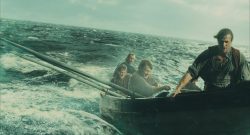 QUESTION: Ron, could you contrast Herman Melville and your inspiration for making this movie in terms of the issues of his time and the issues that inspire you today, such as the environment? Melville as well was interested in the brutality of the Industrial Revolution, and the class conflicts we see on the ship.
QUESTION: Ron, could you contrast Herman Melville and your inspiration for making this movie in terms of the issues of his time and the issues that inspire you today, such as the environment? Melville as well was interested in the brutality of the Industrial Revolution, and the class conflicts we see on the ship.
RON HOWARD: Much of that is present in Nat’s book, Why Read Moby-Dick? When you read about Melville, what was interesting and enlightening to me was that, even in the journals kept by the survivors of the Essex, there was a kind of a question in their minds: was this some sort of divine retribution? This whale turning on them – this was nature turning on them, in the shape of this whale. No one had ever seen anything that fierce occur. So, between what’s written in Moby-Dick, what we know Melville’s concerns to have been as a writer, it was interesting to me that, even while this was an industry that was accepted, it was one of the central, driving components of the economy and human culture. It was doing a lot of good. Crime rates were going down because the streetlights worked better in major cities. But there was this underlying sense of: ‘Is this brutality moral? Is this really the right thing?’
Of course, at that point, our sensibilities were much different, but there’s an easy, contemporary parallel to draw. I thought it was interesting, of course, to say, ‘Well, that was the energy industry then; it was big business; it was about money and power and everything that goes with it. And lo and behold, the energy industry today is vital and central and controversial, in terms of what price are you paying for the positives that go with this kind of energy. So it wasn’t lost on me. It was there in the script to begin with, and very important to the producer, Paula Weinstein. And it was there in the writings of Melville as well. I thought it gave the movie an added measure of complexity and intelligence that was interesting.
QUESTION: Charles, how long did it take you to write the screenplay … because you’re dealing with a lot of material.
CHARLES LEAVITT: It took me a while. First of all, even after reading the book, research alone after that took months. I mean, writing the script took almost the shortest time because you have to do so much research first. It’s pretty much 99 percent thinking and research, and then it took me about four to six months to actually write the script.
QUESTION: I imagine this movie is going to get some people to finally get around to reading Moby-Dick. Nathaniel, when did you first read it?
NATHANIEL PHILBRICK: I first read it as a senior in high school, at Taylor Allderdice, in Pittsburgh. That’s when it started for me. And I’ve now read it twelve times, so – yes, it’s my personal Bible.
TOM HOLLAND: We were given a huge stack of books when we first started prep, which we had to work our way through, and Moby-Dick obviously was one of them. Admittedly, I didn’t finish it – I was ordered to the film – which I’m not necessarily that proud of. But it was a tough one.
CHRIS HEMSWORTH: Didn’t have enough pictures in it.
TOM HOLLAND: Yeah, it wasn’t it comic book.
CHRIS HEMSWORTH: Ron said, ‘Here are the interesting bits,’ which I read. But there’s a reason for that: In the Heart of the Sea was the Bible for me, and Moby-Dick was a fictionalized version of it.








